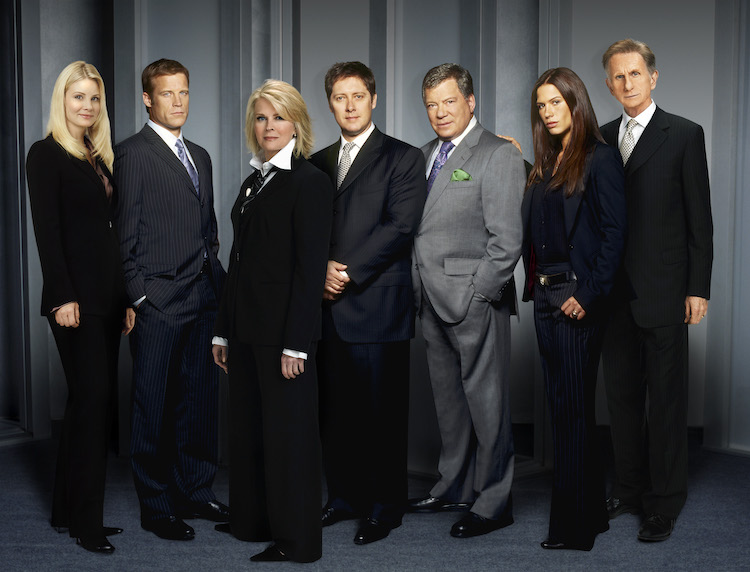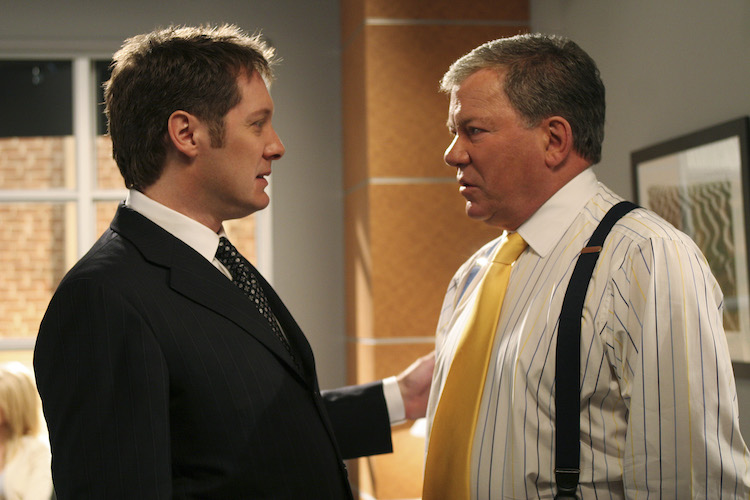'The Practice' vs. 'Boston Legal': How the original stacks up to the spinoff, part 2

Monica Potter (from left), Mark Valley, Candice Bergen, James Spader, William Shatner, Rhona Mitra and Rene Auberjonois in Boston Legal. Photo by Robert Trachtenberg/Disney General Entertainment Content via Getty Images.
In October, I reviewed The Practice. It’s now time to take a look at Boston Legal, compare the two related series and crown the better “legal TV” option. As was the case with The Practice, I am going into this viewing session blind; I'd never before watched an episode of Boston Legal. Let’s dig in.
‘Boston Legal’
Like several other iterations of law-related television (including The Practice), Boston Legal was created by David E. Kelley. The comedy-drama premiered on October 3, 2004, and ran until Dec. 8, 2008. As mentioned in part one, Boston Legal is a direct spinoff of The Practice. To keep some continuity, multiple characters from that show—James Spader as Alan Shore, William Shatner as Denny Crane and Rhona Mitra as Tara Wilson—play prominent roles in Boston Legal’s first season. Shore and Crane also appear throughout the series’ entire run.
‘Death Be Not Proud’
Per usual, my first stop was Episode Ninja, the site where I found Boston Legal’s list of user rankings for the series’ best and worst installments. According to the database, the 17th (and final) episode of season one was voted best. I was excited to be able to start from a relatively early point in the series as opposed to somewhere in the latter seasons. Luckily for me, all five of them are currently streaming with Amazon Prime in the event I enjoy “Death Be Not Proud” and want to see more.
The episode begins with a short intro. From there, we are greeted by Shore. I feel my skin crawl a bit every time I see Spader, no matter the setting. Perhaps it’s just trauma from my younger years of watching him portray the bad guy in hip ’80s films (Less Than Zero, anyone?).
Firm associate Chelina Hall (played by Kerry Washington) approaches Shore (since he is the “best lawyer” she can find) and asks him to come to Texas with her to argue the appeal of a former innocence clinic client set for execution in approximately 72 hours. Hall needs someone to argue for her since she lost her temper with one of the justices during her last appearance, and she fears prejudice. Shore seems more than happy to tag along, noting that he’s always wanted to visit.
And in case anyone is interested, unlike The Practice’s, I actually do like Boston Legal’s theme song. It has a little pep to it.
The episode cuts quickly to Crane, Poole and Schmidt named partner Shirley Schmidt (played by Candice Bergen) consulting with Miriam Watson (Shelley Long). Watson faces a jury trial the following week on allegations that she engaged in sexual conduct for a fee—by paying a man to have sexual relations with her “hundreds of times.” I wasn’t too interested in this storyline (for reasons I’ll explain later), so I’ll just cut to the chase: The firm takes the case, and defendant is informed that her only defense is to argue she suffers a medical condition—namely, nymphomania—that restricted her ability to form the requisite intent to commit the crimes. Crane knows the judge (a virgin), and there is an inference Crane (and/or Watson) bribed him with a date to get a directed verdict.
Back to the capital punishment story: Shore and Hall fly to Texas, where they meet with the defendant, Zeke Borns (portrayed by the immensely talented Sterling K. Brown). Borns has an IQ of 80, DNA evidence shows that another person was at the murder scene and his confession was the result of an all-night interrogation. Borns admits having no recollection of the killing; he confessed because law enforcement consistently and relentlessly told him he committed the killing while he was “doped up,” noting witnesses that put him at the scene. Borns knows he was there pumping gas, so in his mind, his guilt is plausible.
Shore and Hall spend the next day doing everything they can to convince the prosecution and the governor to assist with no success. Shore’s arguments before the Texas Court of Criminal Appeals are impassioned and extremely well-reasoned, but they fail as well. Bonus feature: The episode contains an informative explanation of Texas’s appellate court system.
 James Spader and William Shatner in Boston Legal. Photo by Carin Baer/Disney General Entertainment Content via Getty Images.
James Spader and William Shatner in Boston Legal. Photo by Carin Baer/Disney General Entertainment Content via Getty Images.
Capital punishment on display
Before the execution, Shore and Hall meet with Borns. What transpires is one of the most heart-wrenching scenes I’ve experienced in a made-for-TV legal drama. After the attorneys get the call that the court of appeals denied their argument, Borns says to them, “I’m going to be strong like a hero, you watch.” Borns then delivers a plea veiled as a question: “Will you watch?”
He explains that “I want people to see me strong,” and requests their attendance because he has no other family. They agree, but Shore reserves one last conversation with Borns. Shore asks him to be strong by showing everyone that he is not a monster; he is a human, and a human would feel fear. He asks Borne to show people what it’s like to be executed so they know the process is not peaceful or humane. He suggests that if Borns wants to be a hero, he should “fight to the end and show [his] fear.”
Guards escort Borns to the death chamber, and he asks if he’s allowed to say his last words. When given the chance, he announces, “I don’t know if I did it. But if I did, I’m sorry, you know?” He’s then told that it’s time to “get on now,” but he doesn’t comply; he fights. He resists the officers putting him in the stirrups and straps. He fights as hard as he can, and it is painful to watch. As it should be.
The episode ends with a close-up of Shore’s face as he looks on in shock while the needle approaches.
Over the last few years, my home state of Oklahoma has made national news due to its dealings with the death penalty. Boston Legal focuses on Texas, but I can promise you Oklahoma is right up there regarding how much it loves to put inmates to death. Yes, the governor recently granted an 11th-hour clemency to death row inmate Julius Jones after credible claims of innocence and international outcry, but Oklahoma is more notable for its execution horror stories. There was a dispute back in 2014-2015 about whether our execution cocktail violated the Eighth Amendment’s prohibition against cruel and unusual punishment after inmates were seen suffering as they died. Those concerns have resurfaced when Oklahoma’s latest execution in October (and the first since 2015) ended with a man vomiting and convulsing as he was killed by the state.
Does the humor hit its mark?
Boston Legal is an acceptable law-related television offering. Its primary strength is the vast wealth of acting talent the series offers. Plenty of heavy hitters deliver on their star power, and even the lesser-known players carry their weight if nothing else.
However, my most significant complaint would be that the dual storylines are too jarring. I understand adding the nymphomania plot to lighten such a heavy topic as capital punishment, but I don’t feel the dichotomy fit. Some situations simply shouldn’t be made light of, and the state-sanctioned killing of a human being is one of them.
In conclusion, the show definitely has its high points, mainly attributable to the combined efforts of the all-star cast. Nevertheless, while I’m sure the humor hits hard at times with actors such as Shatner and Spader, I couldn’t personally buy into the ridiculousness of this arc.
Stay tuned for my next column. After reviewing both The Practice and Boston Legal separately, I’ll compare them head-to-head.

Adam Banner
Adam R. Banner is the founder and lead attorney of the Oklahoma Legal Group, a criminal defense law firm in Oklahoma City. His practice focuses solely on state and federal criminal defense. He represents the accused against allegations of sex crimes, violent crimes, drug crimes and white-collar crimes.
The study of law isn’t for everyone, yet its practice and procedure seems to permeate pop culture at an increasing rate. This column is about the intersection of law and pop culture in an attempt to separate the real from the ridiculous.
This column reflects the opinions of the author and not necessarily the views of the ABA Journal—or the American Bar Association.



